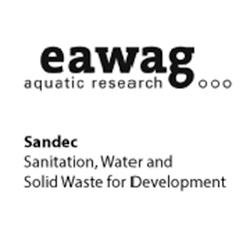Deadline: 25 July 2022
Eawag, the Swiss Federal Institute of Aquatic Science and Technology, is an internationally networked aquatic research institute within the ETH Domain (Swiss Federal Institutes of Technology). Eawag conducts research, education and expert consulting to achieve the dual goals of meeting direct human needs for water and maintaining the function and integrity of aquatic ecosystems.
Sandec, the Department of Sanitation, Water and Solid Waste for Development seeks a motivated and qualified person for an Internship: Evaluating TSS sensors for blackwater dewatering.
Blackwater is the wastewater that comes from toilets, and consists of excreta (urine and faeces), flushwater and cleansing materials. Blackwater treatment can be non-sewered (off-grid, decentralised and semi-centralised) or sewered (centralised).
Globally relevant solutions for non-sewered sanitation have only relatively recently been acknowledged as a sustainable alternative to sewered sanitation. Existing non-sewered blackwater treatment rely mostly on passive and area intensive solutions. The Management of Excreta, Wastewater and Sludge (MEWS) group at Sandec has shown that chemically-enhanced dewatering through the use of conditioners (coagulants and flocculants) can improve dewatering of blackwater. However, optimal dosing of conditioners remains a challenge due the highly variable blackwater characteristics and complexity of floc-formation by conditioners. Total suspended solids (TSS) can be used to predict conditioner dosage. Real-time TSS sensors are available on the market but have never been tested for the use in blackwater.
We are looking for an intern to test different types of TSS sensors for blackwater dewatering. This includes evaluating current research results to develop experiments together with the MEWS project manager and the company Endress+Hauser, working in the lab at Eawag to do bench-scale tests and collaborating with experts from industry and in the field. This project is part of Water Hub at NEST. Approximately 80% of the workload of this internship will be laboratory work at Eawag in Dübendorf, and 20% of the workload is desk-based data analysis.
I. Responsibilities
- Based on existing research, develop an experimental plan to test TSS sensors
- Build an experimental setup and run experiments with real blackwater
- Evaluate and design steps for process integration of TSS sensors
- Collaborate with implementing partners to identify needs in the field
II. Qualifications
- Enrolled in an university program during the entire course of the internship
- Study background in environmental engineering, or similar
- Laboratory skills appropriate for wastewater analysis
- Data analysis skills, experience with Python or R is preferred
- Fluency in English (spoken and written), German is a plus
- Capability to collaborate with research partners and stakeholders
- Willingness to do an internship fully based in Switzerland
III. How to apply?
To apply. please, click HERE . Any other way of applying will not be considered.
IV. Key information
- Duration: five months,
- earliest starting date is 1 August 2022.
- Interviews start from time of posting.
- Eawag will provide an intern salary.
- The intern will be based at Eawag in Dübendorf, Switzerland.
- Supervision: Mr. Michael Vogel and Dr. Linda Strande (Eawag).
For further information about the internship, please contact Michael Vogel.
